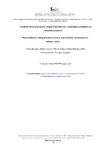Condición física, percepción subjetiva del esfuerzo y rendimiento académico en educación primaria

Use this link to cite
http://hdl.handle.net/2183/24671
Except where otherwise noted, this item's license is described as Atribución-NoComercial-SinDerivadas 4.0 España
Collections
Metadata
Show full item recordTitle
Condición física, percepción subjetiva del esfuerzo y rendimiento académico en educación primariaAlternative Title(s)
Physical fitness, rating perceived exertion and academic performance in primary schoolDate
2020Citation
Ramírez Rubio, V., González, E., & Ruiz, Y. (2019). Condición física, percepción subjetiva del esfuerzo y rendimiento académico en educación primaria. Sportis. Scientific Journal of School Sport, Physical Education and Psychomotricity, 6(1), 80-96. https://doi.org/10.17979/sportis.2020.6.1.5704
Abstract
[Resumen] Existen estudios que han conseguido establecer una relación entre el rendimiento cognitivo y académico de los alumnos y sus niveles de condición física. Los objetivos de esta investigación son estudiar la correlación existente entre el nivel de condición física y la composición corporal con el rendimiento académico, así como analizar la correlación entre dichas variables y la percepción subjetiva del esfuerzo (RPE) por género en alumnos de Educación Primaria. Un total de 69 alumnos de Educación Primaria participaron en el estudio (edad= 12,33±0,47 años, 55,9% niñas y 44,1% niños). La condición física y la composición corporal se evaluaron siguiendo los test de la ALPHA Fitness test Battery para niños y adolescentes. El rendimiento académico se estudió mediante el promedio de notas de las asignaturas instrumentales de Educación Primaria. La RPE se registró en las clases de EF y actividades físicas escolares mediante el uso de la escala RPE de Borg (0-10). Se establecieron correlaciones significativas entre la RPE y el peso de los chicos (r= 0,406, p= 0.02) y las chicas (r= 0,643, p< 0.001) y también con respecto al IMC, chicos (r= 0,508, p= 0.004), chicas (r= 0,621, p< 0.001). Existió una correlación negativa significativa entre el test de la Course Navette y la RPE en el caso de los niños (r= -0,633, p< 0.001) y de las niñas (r= -0,452, p= 0.004). La RPE se correlacionó significativamente con los palieres del test de Course Navette (correlación inversa) y las variables antropométricas, como son el peso y el IMC. [Abstract] There are studies in which it has been possible to establish a relationship between the
cognitive and academic performance of students and their levels of physical condition. The
objectives of this research are to study the correlation between the physical fitness level and
body composition with the academic performance, as well as to analyze the correlation
between such variables and the Rating of Perceived Exertion (RPE) of elementary school
students by gender. A total of 69 primary school students participated in the study (age=
12.33±0.47 years, 55.9% girls and 44,1% boys). The physical fitness and body composition
were evaluated according to the ALPHA Fitness test Battery for children and adolescents. The
academic performance was studied by means of the average of notes of the instrumental
subjects of primary education. The RPE was recorded in PE classes and school physical
activities by using the Borg RPE scale (0-10). Significant correlations were established
between the RPE and the weight of the boys (r= 0,406, p= 0.02) and girls (r= 0,643, p< 0.001)
and also with respect to the BMI, boys (r= 0,508, p= 0.004), girls (r= 0,621, p< 0.001). There
was a significant negative correlation between the Course Navette test and the RPE in the
case of boys (r= -0,633, p< 0.001) and girls (r= -0,452, p= 0.004). The RPE correlated
significantly with the stages of the Course Navette test (inverse correlation) and with the body
composition variables, such as weight and BMI
Keywords
Condición física
Percepción subjetiva de esfuerzo
Índice de masa corporal
Rendimiento académico
Physical fitness
Rating of perceived exertion
Body mass index
Academic performance
Percepción subjetiva de esfuerzo
Índice de masa corporal
Rendimiento académico
Physical fitness
Rating of perceived exertion
Body mass index
Academic performance
Editor version
Rights
Atribución-NoComercial-SinDerivadas 4.0 España
ISSN
2386-8333






